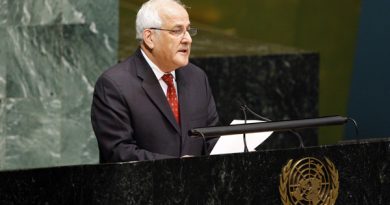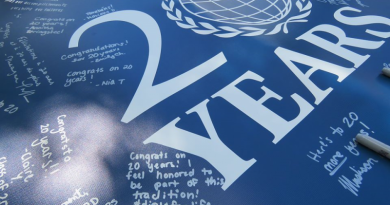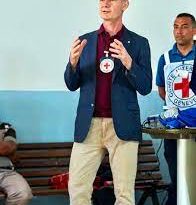Women of Diplomacy Launches With Faculty Speakers
By Madison McHughd
Associate Editor
The Women of Diplomacy Leadership Program held a panel on February 12 featuring five administration and faculty members of the School of Diplomacy to share their success stories as well as their struggles. The panel starred Associate Dean Elizabeth Halpin, Dr. Naaborle Sackeyfio, Dr. Fredline M’Cormack-Hale, Dr. Borislava Manojlovic, and a surprise speaker, Dr. Margarita Balmaceda. Every seat in the Diplomacy Room of McQuaid Hall was filled by women and a few men interested in hearing each professor discuss how they were able to break into their current field of study and become accomplished leaders.
An open forum at the end of the panelists’ speeches revealed much about the situation of women professionals. Dr. Balmaceda brought up a recent article in the New York Times on the continued subordination of women in the workplace, noting that such treatment is not absent even in academia. Dr. M’Cormack-Hale furthered the topic by recalling an instance in which a student would refer to her as “Mrs. M’Cormack” but to her male colleague by his title.
Sophomores Katherine Wolchko and Emily Green, who spearhead the Women of Diplomacy Leadership Program, said there would be more programs like this panel in the future. “We want to get more stories and real first-hand experiences from what our contemporaries have been doing,” Ms. Wolchko said.
Elizabeth Halpin is the Associate Dean of External Affairs. Additionally, she is the advisor of the Women of Diplomacy Leadership Program. Of her career, she said, “The theme of my career path is searching for
opportunities rather than waiting for them to come to me. Don’t be dedicated to one career object, let yourself explore other options,” she said.
Dr. Naaborle Sackeyfio is an Associate Professor as well as a member of the advisory board for Advancing Investments in Trade in Africa (AITA), a non-profit that works in developing sustainable investment practices in Africa. “My mission is to be part of forums and enlighten people interested in making a shift in the notion that Africa is a place of chaos,” she said. Inspired by her Nigerian roots, her work entails much on-the-ground teaching.
Associate Professor Dr. Fredline M’Cormack-Hale’s research focuses on governance in Sierra Leone, where she was born, and advocacy for women’s organizations. Concerning her foray into academia, she said, “I wanted to do something to make a difference, but I didn’t think I wanted to teach with a PhD. My master’s [degree] mentor convinced me I could teach and make a difference at the same time.” Although she initially thought her career path would include communications or documentaries, she found a passion in teaching when she came to Seton Hall. “As a teacher, I really feel committed not just to knowledge but to application as well,” she said.
Dr. Borislava Manojlovic is the Director of Research Projects and Adjunct Professor of Conflict Analysis and Resolution. In the 1990s, the involvement of her native Croatia in the decade-long Yugoslav Wars inspired her to complete a master’s degree in English Language and Literature. She worked closely with the United Nations, first as a translator, then a project manager, then a field officer. “I was part of these huge organizations and saw that things are not always done as they are supposed to be done. I wasn’t happy being there and not doing things that we promised to do,” she said of her experience.
Although Dr. Margarita Balmaceda initially opted not to speak during the panel, after hearing the accounts of her colleagues, she decided to offer her own. Her study of Eastern European languages led to Seton Hall, and passion for her area of expertise made her stay. She expressed that being a professor is much more than teaching, and she wouldn’t want it any other way: “It’s not possible to have everything, at least not at the same time. Anything you do, if you want to do it well, will take a lot of your effort.”



